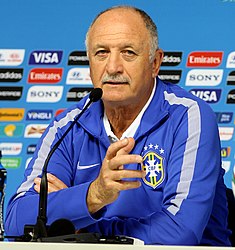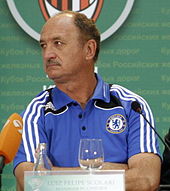Luiz Felipe Scolari
| Luiz Felipe Scolari | ||
 Luiz Felipe Scolari (2014)
|
||
| Personnel | ||
|---|---|---|
| birthday | November 9, 1948 | |
| place of birth | Passo Fundo , Brazil | |
| position | Defender | |
| Juniors | ||
| Years | station | |
| 1966 | Aymore | |
| Men's | ||
| Years | station | Games (goals) 1 |
| 1973-1979 | SER Caxias do Sul | |
| 1980 | EC Juventude | |
| 1980-1981 | EC Novo Hamburgo | |
| 1981 | CS Alagoano | |
| Stations as a trainer | ||
| Years | station | |
| 1982 | CS Alagoano | |
| 1982-1983 | EC Juventude | |
| 1983 | Gremio Esportivo Brasil | |
| 1984-1985 | Al-Shabab | |
| 1986 | Gremio Esportivo Brasil | |
| 1986-1987 | EC Juventude | |
| 1987 | Gremio FBPA | |
| 1988 | Goiás EC | |
| 1988-1990 | Al Qadsia Kuwait | |
| 1990 | Kuwait | |
| 1991 | Criciúma EC | |
| 1991 | Al-Ahli | |
| 1992 | Al Qadsia Kuwait | |
| 1993-1996 | Gremio FBPA | |
| 1996-1997 | Júbilo Iwata | |
| 1997-2000 | SE Palmeiras | |
| 2000-2001 | Cruzeiro EC | |
| 2001-2002 | Brazil | |
| 2003-2008 | Portugal | |
| 2008-2009 | Chelsea FC | |
| 2009-2010 | Bunyodkor Tashkent | |
| 2010–2012 | SE Palmeiras | |
| 2012-2014 | Brazil | |
| 2014-2015 | Gremio FBPA | |
| 2015-2017 | Guangzhou Evergrande | |
| 2018-2019 | SE Palmeiras | |
| 1 Only league games are given. | ||
Luiz Felipe Scolari (born November 9, 1948 in Passo Fundo , Rio Grande do Sul ), also known as Felipão ( Big Felipe ) in his home country , is a Brazilian football coach and former player . His greatest successes came as a national coach: in 2002 he led the Brazilian national team to the world championship title, in 2004 the Portuguese to the European runner-up.
Private
Scolari is the son of a family from Italy who immigrated to Brazil. His father Benjamin, originally from Venice , was considered one of the best defenders in the state of Rio Grande do Sul in the 1940s . Scolari also has Italian citizenship .
Coaching career
Club teams and Kuwait
He began his coaching career in the early 1980s with the provincial club CS Alagoano , with which he became state champion of Alagoas in 1982 , his first title as a coach. This was followed by several positions in Brazil and his first job abroad with the Saudi Arabian club Al-Shabab before he trained in 1987 Foot-Ball Porto Alegrense from Porto Alegre , one of the most famous Brazilian clubs. But Scolari only stayed there for a short time and switched to Goiás EC after a year . He then went to Kuwait for two years, where he first coached Al Qadsia Kuwait and then the Kuwaiti national team. In 1991 he returned to his native Brazil for the Criciúma EC and won the Copa do Brasil with this team in 1991, his first major title. In the same year he left Brazil again to go to Saudi Arabia and train the successful club Al-Ahli . This was followed by a one-year engagement with his former club Al Qadisiya Kuwait.
In 1993 Scolari returned to Brazil again and was hired again at Gremio. There he won a title every season, the cup in 1994, the South American club championship in 1995 and the Brazilian championship title in 1996. Then Scolari went to Japan to Júbilo Iwata and then back to Brazil. He accepted an offer from Sociedade Esportiva Palmeiras of São Paulo . There he won the Brazilian Cup and the Copa Mercosur in 1998 and the Copa Libertadores in 1999 . In 2000 he left São Paulo for Belo Horizonte for the Cruzeiro Esporte Clube .
Brazilian national team
Under Emerson Leão there were more negative results for the Seleção in qualifying for the 2002 World Cup and a disappointing fourth place in the 2001 Confederations Cup . In June 2001 Scolari finally became Brazil's national coach . Initially, the Brazilians also disappointed under him and were eliminated in the quarter-finals of the 2001 Copa America against Honduras. Then Scolari managed to lead the team to the World Cup. The Brazilians found their way back to their old form and won the world title in the final against Germany. After this success he was voted World National Coach of the Year 2002. Nevertheless, the CBF and the fans were dissatisfied with his work, which is why he resigned from his position shortly after the World Cup final.
Portuguese national team
From 2003 Scolari coached the Portuguese national soccer team and reached the final of the 2004 European soccer championship with the host of the tournament . Together with Otto Rehhagel , the opponent in the final, he was the first foreign coach to make it to the final of this competition. In April 2006 he was traded by the British press as a possible successor to England coach Sven-Göran Eriksson , but Scolari turned down the post. Instead, he extended his contract with the Portuguese association until the European Championship in 2008 . After the 0-1 semi-final defeat of his Portuguese against France at the 2006 World Cup in Germany, Scolari suspected that referee Jorge Larrionda ( Uruguay ) had been secretly on the side of the French and had influenced the game accordingly. In the final game for third place on July 8, 2006 in Stuttgart, Scolari's team lost 3-1 to Germany.
In the European Championship qualifier against Serbia on September 12, 2007, there was a scuffle between Scolari and an opposing player, the Serbian Ivica Dragutinović . In this context, Scolari is said to have punched Dragutinovic in the face. Scolari later claimed that he only touched Dragutinovic's hair. The video evidence revealed that Scolari hadn't hit the opposing player because he had evaded in time. Scolari has been banned from UEFA for four caps. At EURO 2008 he led the Portuguese to the quarter-finals, but failed there to Germany with 2: 3 (1: 2).
Chelsea FC
On July 1, 2008 Scolari was coach of Chelsea FC , but was dismissed there on February 9, 2009 because his success fell short of expectations.
Bunjodkor Tashkent
In June 2009 Scolari became head coach and head of the football academy at the Uzbek champions Bunjodkor Tashkent . Because of the club's financial difficulties, Scolari broke his contract prematurely after only one season in May 2010.
Palmeiras
After the Seleção's disappointing performance at the 2010 World Cup , Scolari was briefly traded as the successor to national coach Dunga . Instead, he signed a contract with Palmeiras that ran until the end of 2012 and won the Copa do Brasil with the club in 2012 . After Palmeiras slipped to penultimate place in the table in mid-September 2012, Scolari's contract was prematurely terminated. At the end of the 2012 season, Palmeiras was relegated from the first division.
Return to the Brazilian national team

On November 29, 2012 Scolari again took over the Brazilian national team from Mano Menezes, who had been dismissed six days earlier . He signed a contract until after the 2014 World Cup in his own country. He was supported in this by the former three-time national coach Carlos Alberto Parreira as technical director. With the team he won the Confederations Cup in 2013 with a 3-0 final win against Spain. At the 2014 World Cup, his team reached the semi-final against Germany after a 1: 7 only the game for third place against the Netherlands, which was lost 3-0. The balance of his second term in office was 19 wins in 29 games, six draws and four defeats. On July 14, 2014, the President of the CBF, José Maria Marin , accepted Scolari's resignation.
At three world championships, Scolari always led the teams entrusted to him at least to the semi-finals, i.e. among the top four. Accordingly, he was the coach in charge of 21 World Cup games on the bench. Only Helmut Schön and Carlos Alberto Parreira have had more banking experience in the history of the World Cup.
Return to Gremio Porto Alegre
On July 29, 2014 Scolari moved to Grêmio Porto Alegre.
Engagement with Guangzhou Evergrande
In June 2015, he replaced Fabio Cannavaro as head coach at Guangzhou Evergrande in China .
Success as a trainer
-
Brazilian champion :
- 1996 with Grêmio Porto Alegre
- 2018 with Palmeiras São Paulo
-
Brazilian Cup Winner :
- 1991 with the Criciúma EC
- 1994 with Grêmio Porto Alegre
- 1998 , 2012 with Palmeiras São Paulo
- Uzbek champion : 2010 with Bunyodkor Tashkent
- Copa Libertadores :
- Copa Mercosur : 1998 with Palmeiras São Paulo
- World Champion : 2002 with Brazil
- Vice European Champion : 2004 with Portugal
- World Championship fourth:
- World national coach : 2002
- FIFA Confederations Cup Winner : 2013 with Brazil
- AFC Champions League : 2015 with Guangzhou Evergrande
- Chinese champion : 2015 , 2016 with Guangzhou Evergrande
- Chinese cup winner : 2016 with Guangzhou Evergrande
- Chinese Supercup : 2016, 2017 with Guangzhou Evergrande
Awards
- Prêmio Craque do Brasileirão : Best Trainer 2018
- Bola de Prata : 2018
Web links
Individual evidence
- ↑ Scolari goes to Chelsea ( Memento from October 6, 2008 in the Internet Archive ), sportschau.de from June 11, 2008 (accessed on August 11, 2011)
- ↑ SCOLARI DISMISSED ( Memento from April 24, 2012 in the Internet Archive ), message on the Chelsea FC website from February 9, 2009 (English, accessed on August 11, 2011)
- ↑ Scolari in «Bunyodkor» ( Memento of June 13, 2009 in the Internet Archive ), message on the Bunjodkor Tashkent website of June 10, 2009 (English, accessed on August 11, 2011)
- ↑ Scolari leaves Bunyodkor , focus.de, May 28, 2010 (accessed August 11, 2011)
- ↑ Scolari takes over Palmeiras , kicker.de from June 13, 2010 (accessed on August 11, 2011)
- ↑ Scolari has to take his hat , kicker.de from September 13, 2012 (accessed on September 14, 2012)
- ↑ Scolari is the new Brazilian national coach ( memento from February 11, 2013 in the web archive archive.today ) in: Financial Times , November 29, 2012
- ↑ Estadao: Felipão chega e fala que ganhar o título em 2014 é 'obrigação' , November 29, 2012
- ↑ http://br.reuters.com/article/topNews/idBRKBN0FJ2M220140714
- ↑ Scolari clears the field. In: sueddeutsche.de. July 15, 2014, accessed March 16, 2018 .
- ↑ The coaches with the most games at World Cup finals. In: fussball-wm-total.de. FOOTBALL World Cup total, accessed on July 17, 2014 .
- ↑ http://www.transfermarkt.de/chinese-fa-super-cup/startseite/pokalwettbewerb/CHSC
| personal data | |
|---|---|
| SURNAME | Scolari, Luiz Felipe |
| BRIEF DESCRIPTION | Brazilian soccer player and coach |
| DATE OF BIRTH | November 9, 1948 |
| PLACE OF BIRTH | Passo Fundo , Rio Grande do Sul |




